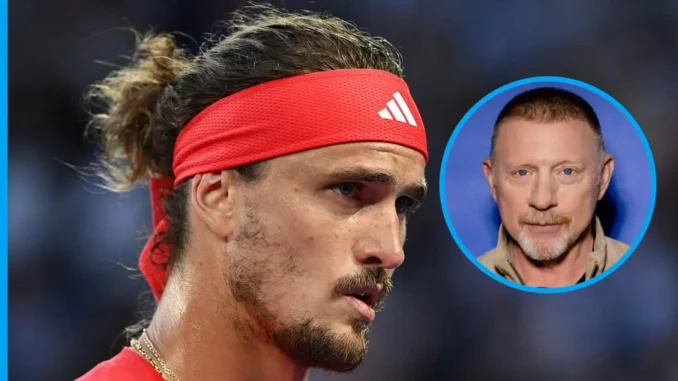
In the wake of a bruising quarter-final exit at the 2025 French Open, Alexander Zverev, the world’s No. 3 tennis player, has found himself at the center of a heated debate sparked by German tennis legend Boris Becker. The 28-year-old Hamburg native, still chasing his elusive first Grand Slam title, fell to Novak Djokovic in a gripping four-set battle on June 4, with a scoreline of 4-6, 6-3, 6-2, 6-4. The defeat marked the first time since 2020 that Zverev failed to reach at least the semi-finals at Roland Garros, amplifying scrutiny on his performance and career trajectory. Becker, a six-time Grand Slam champion, didn’t hold back, criticizing Zverev’s passive play and urging a drastic overhaul of his coaching setup, led by his father, Alexander Sr., and brother, Mischa. Zverev, however, responded with fiery defiance at a press conference in Stuttgart, setting the stage for a compelling narrative as he transitions to the grass-court season.
Zverev’s Roland Garros campaign began with promise, as he navigated early rounds with relative ease, only pushed beyond straight sets by Jesper de Jong in the second round. His fourth-round opponent, Tallon Griekspoor, retired mid-match, giving Zverev a breather before facing Djokovic. Despite claiming the first set 6-4, Zverev struggled as Djokovic’s tactical brilliance, including 35 drop shots, exposed his vulnerabilities. “I was not really doing much,” Zverev admitted, citing cold weather that slowed his serve and groundstrokes. “It was difficult for me to find a solution in the cold conditions.” Becker seized on this, arguing on Eurosport Germany that Zverev’s passive approach against top players like Djokovic, Jannik Sinner, and Carlos Alcaraz won’t cut it. “You get the impression that he plays in the same rut against the top players and hopes that the result will be good,” Becker said. “His father and brother did an excellent job, but it wasn’t good enough for the final step.”
Becker’s critique didn’t stop at tactics. He pointed to Zverev’s coaching setup as a potential roadblock, suggesting a fresh perspective is needed to break through. Drawing parallels with Rafael Nadal’s evolution from Toni Nadal to coaches like Carlos Moya, Becker emphasized, “At some point, you need new noises and a new environment. He is the chairman of the board, the CEO. He decides what Team Zverev will look like in the future.” Barbara Rittner, Germany’s Billie Jean King Cup captain, echoed Becker’s sentiments, questioning Zverev’s excuses about weather conditions. “He can’t tell me that,” she said sharply. Zverev, however, dismissed Rittner’s critique outright. “I don’t know why she suddenly has so much to say about my tennis career,” he fired back in Stuttgart. “To be honest, I don’t take her opinion seriously. Firstly, because of that, and secondly, because I think she’s wrong.”
Zverev’s response to Becker was more nuanced but no less pointed. “When things are going well for me, I always do everything right. When things are going badly for me, everyone else is very, very clever. Unfortunately, Boris is one of them,” he said, his frustration palpable. Yet, he tempered his retort with respect, acknowledging their prior rapport. “I also had a lot of contact with Boris before he made that statement. I still have massive respect for him. He is an absolute legend, not only in sport, but in Germany in general, and also worldwide. I will always listen to what he has to say, but I don’t always have to agree.” Zverev’s defiance underscores his belief in his ability to compete with the likes of Sinner and Alcaraz. “I still see myself as a candidate to compete against the two guys up there,” he asserted, referencing the young stars who have already claimed Grand Slam titles.
The defeat in Paris was a setback in a challenging 2025 season for Zverev, who started the year with a runner-up finish at the Australian Open, losing to Sinner in a tight final. His clay season was marred by early exits in Monte Carlo and Madrid, though a title in Munich offered a glimmer of form. With a 5-18 record against top-10 players in Grand Slams, the pressure is mounting. Becker warned, “The dream of a Grand Slam title isn’t over, but with every missed opportunity, it becomes more difficult. The younger generation is getting better.” As Zverev prepares for the Stuttgart Open, where he faces either Fabio Fognini or Corentin Moutet, he’s determined to silence critics. His return to the BOSS OPEN, greeted by throngs of fans, signals a fresh start. “The facility is still beautiful. Hopefully it will be a great week,” he said, eager to harness the home crowd’s energy.
Zverev’s journey is far from over. His resilience, forged through a career-threatening ankle injury in 2022, fuels his resolve. As he navigates the grass season and eyes Wimbledon, the debate over his coaching setup and mental approach will linger. Will he heed Becker’s call for change, or double down on his family-led team? For now, Zverev’s fiery response shows a player unafraid to stand his ground, ready to prove he belongs among tennis’s elite.
Leave a Reply